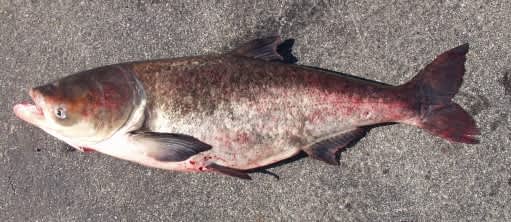Asian Carp Pushing North in the Mississippi River
OutdoorHub Reporters 03.12.14

The US Geological Survey (USGS) announced on Tuesday that Asian carp eggs have been found in the Upper Mississippi River as far north as Lynxville, Wisconsin. These findings place the invasive species 250 miles upstream of their previously-known spawning sites.
“This discovery means that Asian carp spawned much farther north in the Mississippi than previously recorded,” said Leon Carl, USGS Midwest Regional Director. “The presence of eggs in the samples indicates that spawning occurred, but we do not know if eggs hatched and survived or whether future spawning events would result in live fish.”
The eggs were found in seven locations in the stretch of river between Keokuk, Iowa and Lynxville as part of a research project undertaken by the USGS and Western Illinois University. Scientists visually identified the eggs as belonging to either bighead or silver carp, and possibly grass carp as well. Researchers are currently waiting on more accurate genetic tests, which it can take a few weeks. According to the release, some of the eggs include late-state embryos about ready to hatch.
“Invasive Asian carp could pose substantial environmental risks and economic impacts to the Upper Mississippi River if they become established,” Carl said. “Further research will help us to better understand their habitat requirements and inform integrated control efforts.”
Bighead carp and the closely related silver carp have been a menace in the Mississippi River for decades. Initially imported into the United States for their ability to eat zooplankton and improve water quality, the carp escaped into and colonized the Mississippi River. Now the fish have a firm hold on the largest drainage system in North America, providing Asian carp with access to at least 31 states. The US Fish and Wildlife Service, US Army Corps of Engineers, and numerous state agencies and conservation groups are working to halt the fish’s advance before Asian carp enter the Great Lakes, the largest freshwater lake system in the world and the seat of more than $7 billion in annual fishing revenue.
Earlier this year the US Army Corps of Engineers released a report with possible solutions to bar the fish from the Great Lakes, including an $18 billion plan to separate the lake system from the Mississippi River. While it may seem drastic, Asian carp are highly adaptable and can easily out-compete native fish. In addition to ousting native species, bighead and silver carp are also difficult to catch on rod-and-reel and not highly attractive as food fish. If the carp become established in the Upper Mississippi River, it could mean a drastic change in the number and type of fish in the waterway. Some anglers and conservationists have been calling for actions such as closing the Upper St. Anthony Falls Lock and Dam to keep the fish from advancing north.

